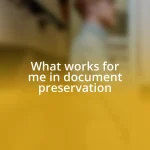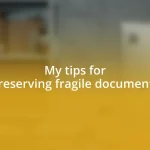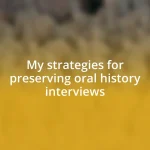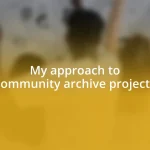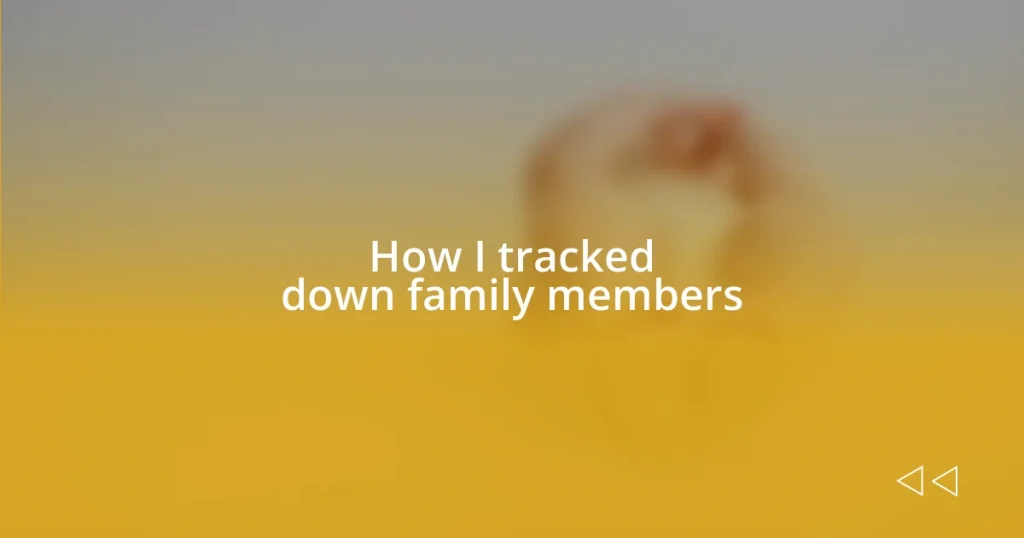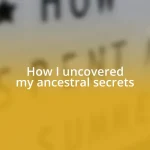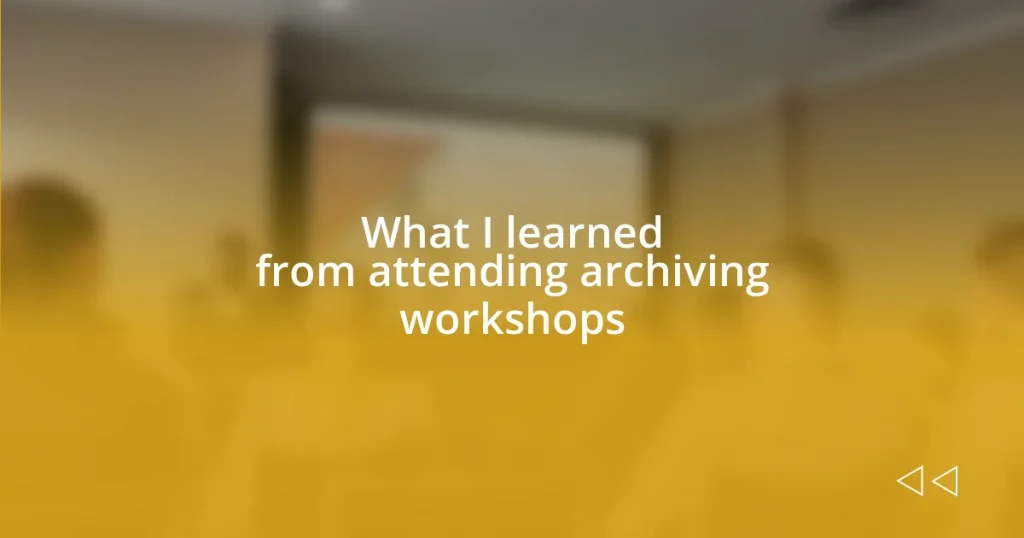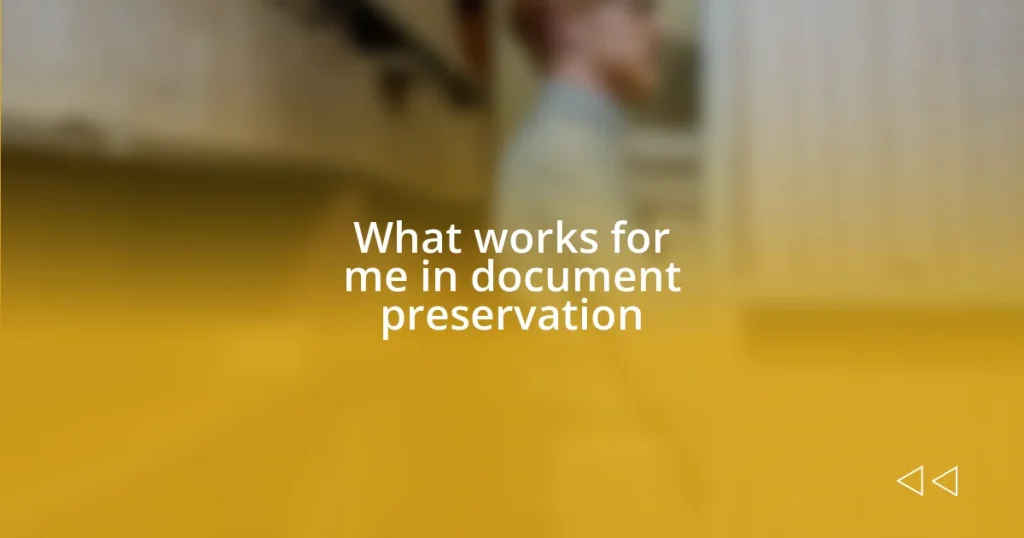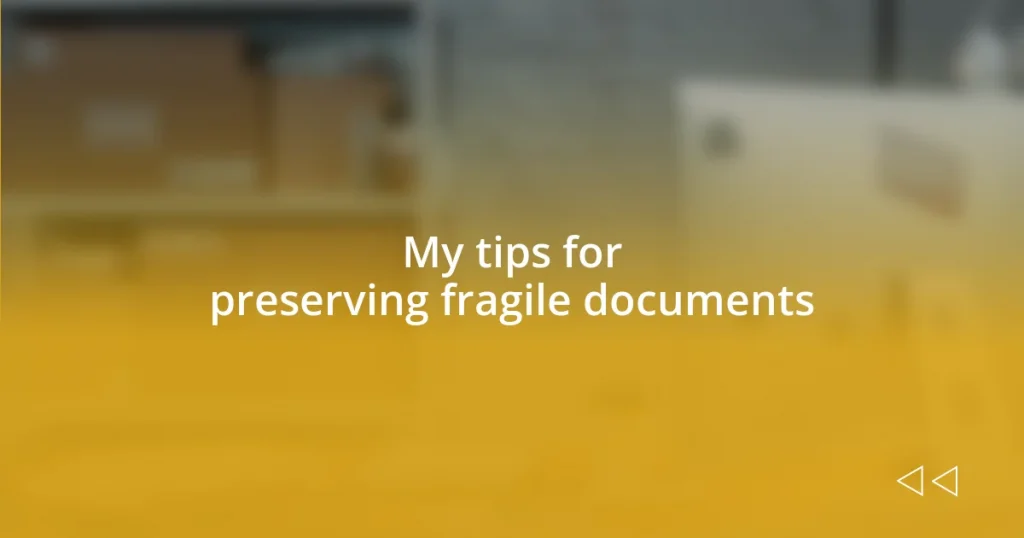Key takeaways:
- Utilizing various tracking methods, such as social media and family interviews, can profoundly enhance family connection and discovery.
- Choosing the right genealogy tools, like Ancestry.com and FamilySearch, streamlines research and can lead to unexpected familial revelations.
- Respecting privacy and ethical considerations is crucial when documenting family history to maintain trust and honor individual stories.

Understanding family tracking methods
When it comes to tracking down family members, I often rely on a mix of traditional and digital methods. For instance, I’ve spent countless hours sifting through old family trees and public records. There’s something deeply satisfying about piecing together a family history, don’t you think?
Utilizing social media can be a game changer. I remember a time when I stumbled upon an uncle’s old Facebook profile, a digital goldmine of connections. It was like opening a door to a treasure trove of relatives I never knew existed. Have you ever thought about how these platforms can rekindle lost connections?
Another approach I find invaluable is reaching out to extended family. Once, I simply called my aunt, hoping for a lead, and she shared stories and names that opened up a whole new branch of our family tree. The emotions tied to these connections can be powerful; discovering someone you thought you’d never know can lead to a feeling of belonging that’s hard to replicate. What would you do if I offered you a chance to reconnect with a long-lost relative?
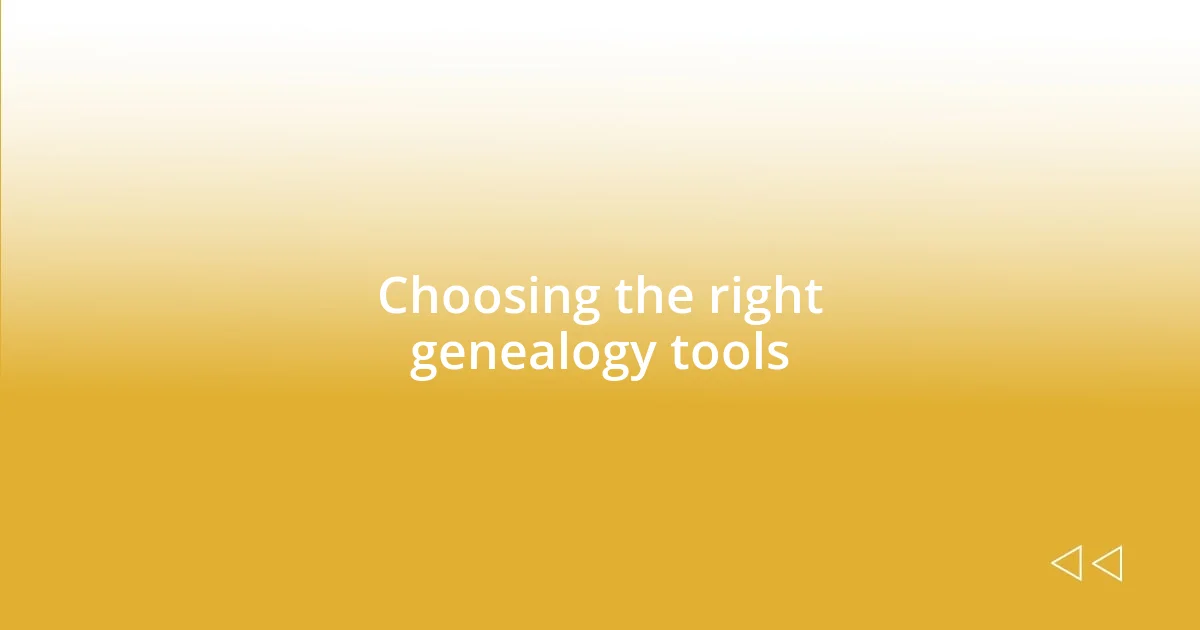
Choosing the right genealogy tools
Choosing the right genealogy tools can significantly streamline your search process. I’ve experimented with many online platforms, but a few truly stand out. For example, websites like Ancestry.com and FamilySearch not only offer extensive databases but also user-friendly interfaces that make navigation feel almost effortless. Have you ever faced the frustration of a complicated site that makes research feel like climbing a mountain? I certainly have, and it makes all the difference to choose tools that enhance your experience rather than hinder it.
When evaluating these tools, I focus on features such as historical records, family tree builders, and DNA testing options. During my research, I opted for a site with robust DNA matching capabilities, which surprised me by connecting me with a third cousin I had never considered! It really drove home the importance of comprehensive resources; having access to unique functionalities can lead to surprising family discoveries. What functions do you think would be most beneficial for you?
Once you’ve kindled your curiosity, consider the cost of these services. Some tools are free, while others require subscriptions. In my experience, investing a bit in a premium service can yield incredible results. For instance, a paid subscription to a genealogy site allowed me to access rich historical records that completely transformed my perspective on my family’s past. It’s a bit like being handed a key to a long-locked door; would you invest in something that promises to unlock your history?
| Tool | Features |
|---|---|
| Ancestry.com | Extensive databases, DNA testing, user-friendly family tree builder |
| FamilySearch | Free access to records, collaborative family tree sharing |
| MyHeritage | DNA matching, photo enhancements, global records |
| Findmypast | UK records specially focused, newspaper archives |

Utilizing online ancestry databases
Using online ancestry databases has been a real game changer in my quest to locate family members. I vividly remember my first experience on Ancestry.com. As I clicked through records, I stumbled upon an old census document that listed my great-grandparents. Seeing their names felt like unearthing a piece of my own identity. It’s incredible how these databases can turn abstract names into real people with stories, making the hunt feel deeply personal.
Here are some key features I find useful in online ancestry databases:
- Historical Records: Access to birth, marriage, and death records can help establish family connections.
- User-Friendly Interfaces: A straightforward layout allows for seamless navigation, making research enjoyable instead of tedious.
- Collaborative Family Trees: Some sites enable users to share trees, providing a wider network for discovering relatives.
- DNA Testing: Analyzing genetic connections can lead to unexpected discoveries and help confirm relationships.
- Specialized Databases: Certain platforms focus on specific regions, offering deeper insights into ancestral backgrounds.
In my experience, utilizing these features can significantly enhance the research process, turning mere names on a page into heartfelt connections and shared histories. Every new discovery stirs a sense of belonging, evoking emotions I never anticipated. It’s like meeting pieces of oneself that were lost in time.
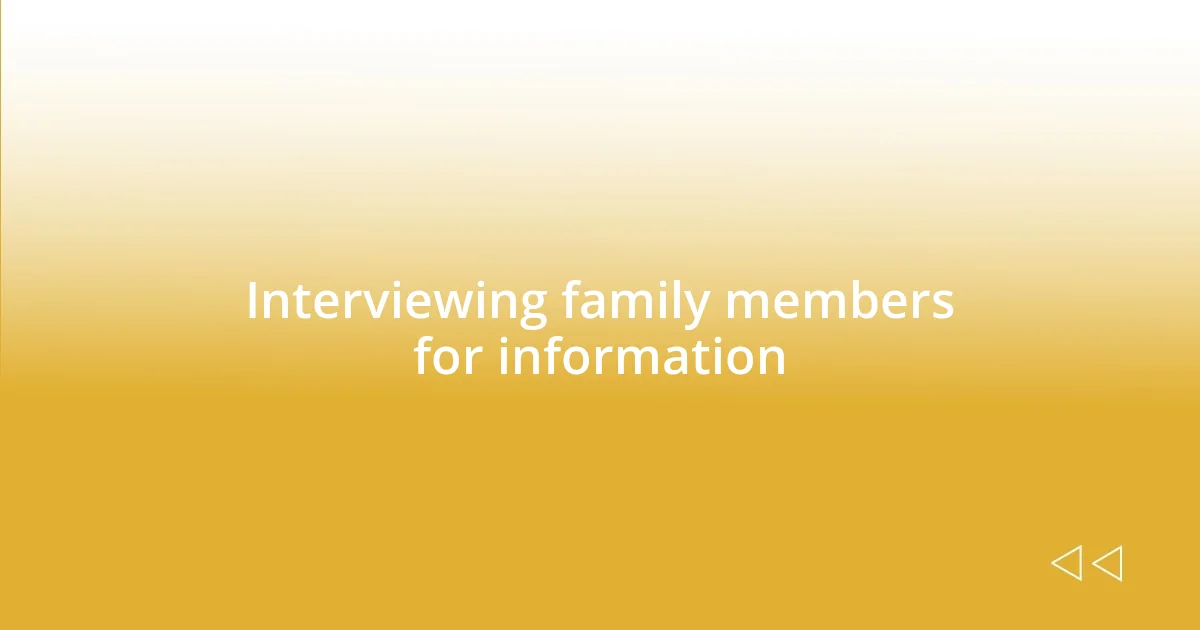
Interviewing family members for information
When I first interviewed my aunt about our family history, I approached it with both excitement and nervousness. I had prepared some questions, but what surprised me was her willingness to dive deeply into her memories. As she spoke about our grandparents’ immigration story, I found myself captivated. I asked follow-up questions like, “What do you remember most about their journey?” This opened up a dialogue that not only helped me gather facts but also painted a vivid picture of their struggles and triumphs. Have you ever heard a story so powerful that it almost felt like you were living it with them?
Listening intently during these conversations is key. I noticed that the more interested I seemed, the more my family members wanted to share. I remember my cousin recalling a holiday tradition that had been lost over the years. As he described the chaotic family gatherings filled with laughter and homemade recipes, I felt a tangible connection to a piece of our heritage I had never known. Isn’t it amazing how a simple question can unlock rich, familial treasures and insights?
Capturing these stories is just as important as asking the right questions. I found that recording the interviews, with permission, helped me keep track of the details I might have missed. It’s common to forget key points when emotions run high. Listening back to those recordings not only helps with accuracy but also allows you to relive those moments, immersing yourself anew in the emotional tapestry of your family’s past. Have you thought about how those intimate stories might shift your perception of who you are? They certainly influenced mine, making me appreciate the roots from which I come.

Organizing and documenting your findings
Documenting your findings is crucial in keeping track of the many threads of your family history. I remember sitting down with a notebook, realizing that the information I was gathering could easily become overwhelming. A simple spreadsheet transformed my chaotic notes into a structured layout. By categorizing names, dates, and relationships, I found clarity, and each entry became a piece of a larger puzzle. How do you keep all your findings organized?
Visual aids can also play a significant role in this process. When I began mapping out my family tree, I was struck by how much it illuminated my understanding of our lineage. Lines connecting faces, dates inscribed beside names — it brought a certain joy to visualize our connections. I used color codes to indicate different branches, which provided an even clearer picture of where everyone fit. Have you considered how creating a visual representation might deepen your appreciation for your family’s story?
Lastly, don’t underestimate the power of anecdotes and memories in your documentation. I made a point to jot down not just the facts but also the stories behind them. For instance, I noted the whimsical way my grandmother would recount how she met my grandfather at a dance. These narratives add depth and emotion to the raw data, reminding me that behind every name is a life filled with experiences. How might these personal touches enrich your understanding of your ancestry? In my experience, it transforms a simple family tree into a living, breathing history.
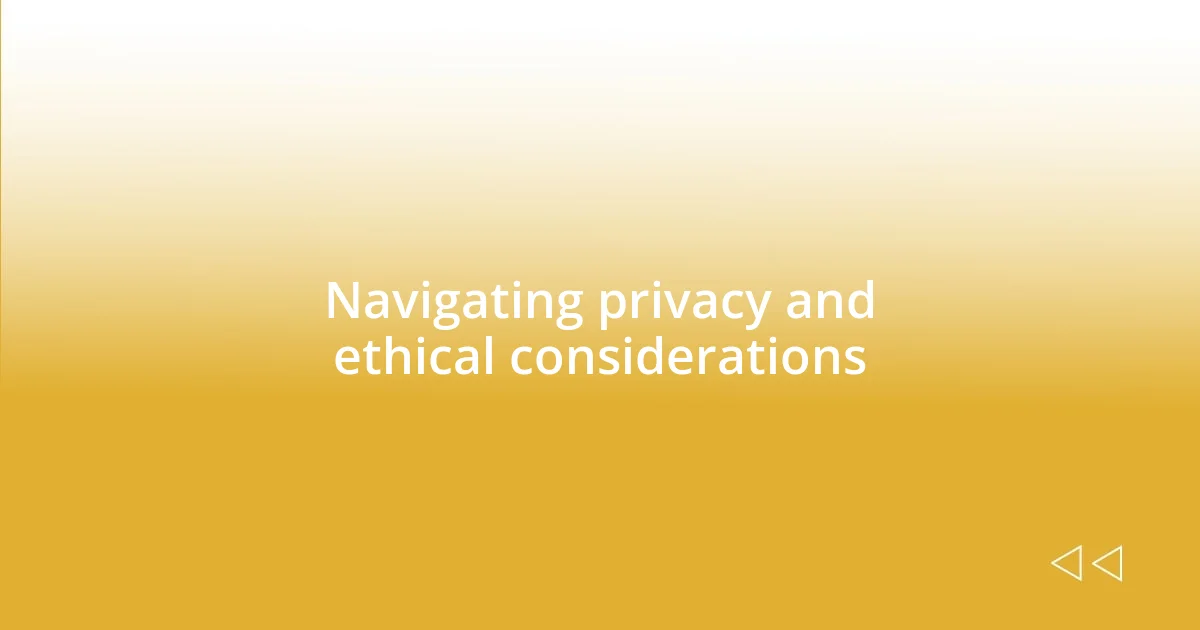
Navigating privacy and ethical considerations
Navigating privacy and ethical considerations is an essential part of tracking down family members. I learned this firsthand when I stumbled upon some sensitive information about a distant relative. It made me pause and consider the implications of what I had found. Have you ever wondered how much personal information is too much? I believe respecting boundaries is paramount; not everyone may wish to share their story, and that’s okay.
During my research, I reached out to numerous relatives, but I was always conscious of their privacy. I asked for consent before sharing any pieces of their personal history, particularly stories that might be sensitive or painful. This approach not only helped foster trust but also maintained the integrity of our relationships. I recall a conversation with a cousin who hesitated to share a chapter of her past. I respected her choice and assured her that whatever she felt comfortable giving was more than enough. Isn’t it beautiful how creating a safe space can lead to more open, honest dialogue?
As I continued my journey, I also reflected on the ethical responsibility we hold in documenting family stories. When I decided to write about our family’s experiences, I made it a point to anonymize specific details that could infringe on others’ privacy. I think about the generations that came before me; their stories deserve to be told with dignity. How do you balance storytelling with respect for those involved? For me, it’s about honoring their voices while acknowledging that some narratives are better left untold.

